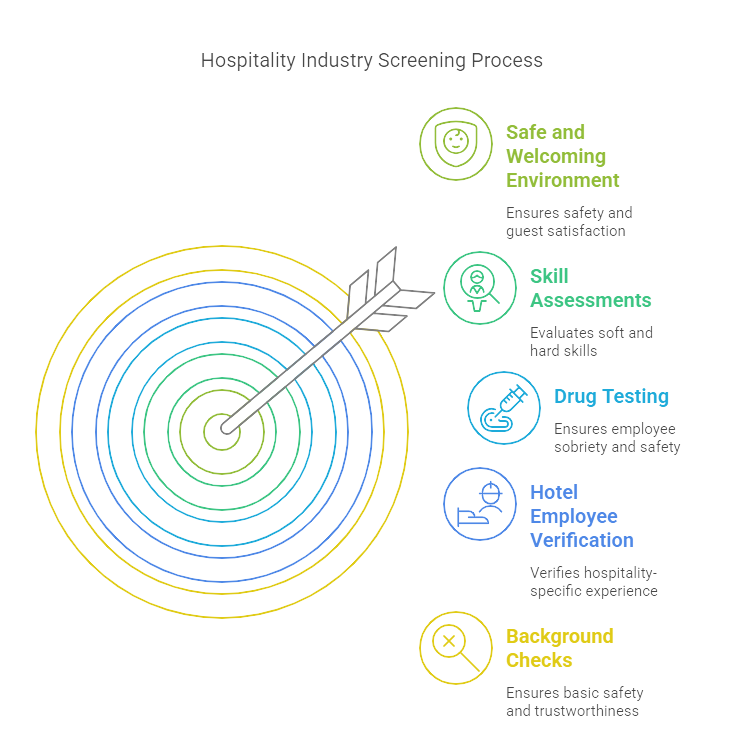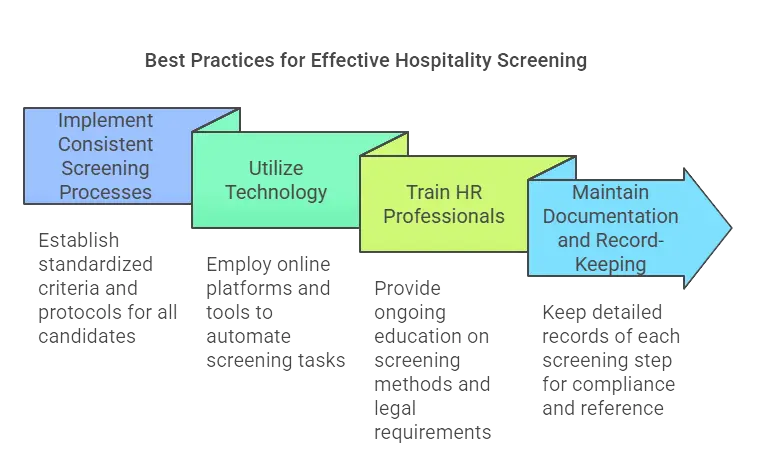Hiring in the hospitality industry involves more than just finding the right skills and personality — it involves ensuring a safe environment for both employees and guests. This comprehensive guide aims to equip business owners, HR professionals, recruiters, and job seekers in the hospitality sector with the knowledge to implement thorough hospitality industry screening processes. Read on to understand the importance of effective screening, the types of verifications needed, legal considerations, and best practices to maintain a trustworthy and safe working environment.
Key Takeaways
- Thorough screening processes are vital for safeguarding guests and maintaining trust in the hospitality industry.
- Key screening elements include comprehensive background checks, precise hotel employee verifications, routine drug testing, and rigorous skill assessments.
- Legal compliance, from understanding federal laws to international hiring guidelines, is essential in the screening process.
- Utilizing technology and maintaining consistent procedures significantly streamline and enhance the effectiveness of hiring practices.
- Training HR professionals and diligent record-keeping fortify these efforts, ensuring a secure and thriving hospitality environment.
Introduction
Safety and security within the hospitality industry are non-negotiables. Think about the inherent trust guests place in hotels, resorts, and restaurants—not just for comfort but for personal safety. Now, picture this intricate trust web being breached because a new hire wasn't properly vetted. It’s a scenario no owner wants to face, but it's preventable.
Why does screening matter so much in this sector? Simply put, the stakes are exceptionally high. From high-profile incidents making the news to everyday infractions that quietly damage the operation's integrity, the importance of thorough vetting can't be overstated. Through rigorous screening processes, businesses protect their guests, employees, and bottom line.
This guide will walk you through effective screening methods, legal frameworks, and best practices for maintaining a secure environment. It’s not just about ticking boxes—it’s about ensuring the safety and well-being of everyone in your establishment. Stick with us to learn how you can implement robust screening processes that fortify your hospitality operations against risks.

The Importance of Screening in the Hospitality Industry
Ensuring guest safety is the cornerstone of any successful hospitality operation. Guests expect a haven where they can relax and enjoy their stay, and thorough employee screening plays an essential role in maintaining this environment.
EXPERT INSIGHT: In hospitality recruitment, it is so much more than competency against a job description—it is trust and safety and our implicit responsibility of care we have to each and every guest and associate. As HR experts, we are specifically charged with supporting creating areas in which people are safe and valued. Thorough screening processes are not just policy—active intentions to be excellent and of integrity. By taking time and effort to get it right, we are not just filling a gap with a body; we are developing a culture of trust and safety that improves our overall guest experience. - Charm Paz, CHRP
Guest Safety
When it comes to guest safety, meticulous screening can make all the difference. By weeding out unsuitable candidates, the risk of criminal activity, misconduct, or negligence within your establishment significantly diminishes. For instance, consider a case where a lack of adequate background checks led to a hotel hiring an individual with a history of thefts at previous workplaces, culminating in a high-profile robbery that damaged the hotel's reputation.
Statistics underscore the importance of this process. According to industry reports, businesses experience a 38% decrease in workplace incidents when robust pre-employment screening protocols are in place. This isn't just about protecting assets; it's about cultivating an environment where guests can feel secure and unworried, thus fostering trust and repeat business.
Operational Integrity
The importance of proper screening extends to operational integrity as well. Employing individuals who have been accurately vetted ensures reliability and productivity among the workforce. Effective screening helps identify candidates who are not only qualified but also embody the values and ethics your establishment strives to uphold.
Common risks mitigated by effective screening include theft, substance abuse, and workplace harassment. Theft prevention, for one, not only safeguards property but also reduces costs related to loss and insurance. Similarly, identifying potential substance abusers through drug tests prevents issues related to liability and ensures a focused, efficient team.
Ultimately, a rigorous screening process is a strategic investment. It aligns human resources with the establishment's safety and operational goals, creating a stable environment that benefits both employees and guests alike. By placing screening at the forefront, hospitality businesses can thrive while ensuring a safe, trustworthy, and enjoyable experience for everyone.
Types of Hospitality Industry Screening
When it comes to the hospitality industry, screening isn't just a formality; it's the backbone of maintaining a safe, efficient, and trustworthy establishment. The rigors of hospitality mean we need a multi-faceted approach, and here's how to get it right.
Background Checks
A detailed background check is your first line of defense in ensuring a safe work environment. By thoroughly investigating a potential hire's history, you weed out individuals who may pose a risk to both your staff and guests.
Components
- Criminal History: This is a must. Understanding an applicant’s past brushes with the law (if any) helps you ascertain their trustworthiness.
- Employment History: Confirming past employment can reveal a candidate’s stability and reliability, critical traits in any hospitality setting.
- Education Verification: Ensure the applicant’s educational qualifications meet your job requirements. It’s about knowing they have the required background.
- Learn more about background checks from the U.S. Department of Labor.
Hotel Employee Verification
This goes beyond the basic background check. You’re looking at previous roles specifically within the hospitality industry.
Methods
- Verifying Prior Experience: Call past employers and verify job titles, responsibilities, and length of employment to get a clear picture of their hospitality experience.
- Cross-Checking References: Speak with references to get insights into the candidate's work ethic and behavior in a hotel setting. This is gold for understanding their guest-interaction skills.
Drug Testing
Drug testing ensures that employees aren’t impaired while working, which is crucial when safety and guest well-being are on the line. Make sure to follow state and federal guidelines regarding drug testing to avoid any legal repercussions. Always be clear and transparent about your testing policies.
Skill Assessments
Hospitality roles require a blend of soft and hard skills. From customer service acumen to technical know-how, assessing these capabilities helps you find the right fit.
Examples
- Soft Skills: Role-playing scenarios can reveal how a candidate might handle difficult guests or stressful situations.
- Hard Skills: Practical tests, like typing speeds or reservation system proficiency, show if they can manage the technical parts of the job.
Effective screening in the hospitality industry isn’t just about ticking boxes. It’s an integrated approach to building a team that not only performs well but contributes to a safe and welcoming environment for everyone.

Legal Considerations in Hospitality Screening
Navigating the legal landscape in hospitality screening is essential to avoid potential pitfalls and ensure compliance with laws that affect how you hire and manage employees.
Compliance with Local and Federal Laws
Understanding and adhering to local and federal regulations in screening processes is crucial. Compliance with the Fair Credit Reporting Act (FCRA) is a must, as it governs how background checks should be conducted. The FCRA mandates transparency, requiring employers to obtain written consent from candidates before performing background checks and to provide them with a copy of the report if it influences a hiring decision. Additionally, employers must abide by Equal Employment Opportunity Commission (EEOC) guidelines to prevent discriminatory practices. For instance, utilizing a criminal record to exclude candidates must be justifiable with job relevance. Check out detailed guidelines and legal references here.
International Hiring
When hiring international staff, additional legal considerations come into play. Employers must verify work eligibility through visa checks and adherence to immigration laws. The process often entails confirming the legal status of workers and ensuring all necessary documentation, like I-9 forms in the U.S., is properly filled out. Cross-border employment can also involve understanding varying labor laws between countries, affecting how you approach international candidates. Being diligent in international hiring ensures that you not only comply with laws but also foster a diverse and legally sound workforce.
Best Practices for Effective Hospitality Screening
Consistent Screening Processes
To maintain fairness and transparency, it's crucial to implement a standardized screening process for all candidates. Start by outlining clear criteria and protocols for each stage of the hiring process. Develop a checklist that includes everything from initial application reviews to final interviews. By maintaining uniformity, not only do you ensure that every applicant is measured against the same yardstick, but you also minimize biases and oversights.
Using Technology
Technology can significantly streamline the screening process. Utilize modern online platforms and tools that automate resume parsing, background checks, and even skill assessments. Services like Applicant Tracking Systems (ATS) and specialized screening software help manage data efficiently, saving time and reducing errors. With real-time alerts and monitoring, these tools allow for faster, more accurate hiring decisions.
Training for HR Professionals
A well-trained HR team is essential for effective screening. Invest in continual education, familiarizing your team with the latest screening methods, legal requirements, and ethical considerations. Recommended training programs include courses on the Fair Credit Reporting Act (FCRA) and Equal Employment Opportunity Commission (EEOC) guidelines. Staying updated on industry standards ensures compliance and enhances the overall hiring process.
Documentation and Record-Keeping
Proper documentation and meticulous record-keeping are non-negotiable. Record every step of the screening process, from initial contact to final employment decisions. This comprehensive documentation not only aids in compliance with legal requirements but also serves as a valuable reference for resolving future disputes. Store these records securely while ensuring easy accessibility for authorized personnel.
By integrating these best practices into your hiring process, you create a safer, more trustworthy environment for both employees and guests.

Challenges and Solutions in Hospitality Screening
High Turnover Rates
One of the most daunting challenges in the hospitality industry is its notoriously high turnover rate. Employees often move on quickly, either to different sectors or other establishments within the industry. This can make it difficult to maintain a consistent, efficient, and thorough screening process.
Solution: Implement a rolling screening system. With a rolling system, the screening process never stops. Keep a continuous flow of candidates through screening pipelines, regularly updating and refining your list of potential hires. Utilize technology to manage and track applicants to ensure no step is missed. Retain a pool of pre-screened applicants ready to step in when positions become vacant. This keeps the hiring process smooth and lessens the impact of high turnover.
Seasonal Hiring
Seasonal hiring poses a unique set of challenges. During peak seasons, the demand for temporary staff skyrockets, but the need for comprehensive screening remains unchanged. However, the increased pressure and volume can lead to hasty and potentially inadequate checks.
Solution: Expedite the screening process by using pre-employment platforms that specialize in rapid background checks and verifications. These platforms can significantly reduce the time needed to complete thorough screenings. Also, consider developing a fast-track screening process for returning seasonal employees with a history of good performance and reliability.
Maintaining Guest Safety
Maintaining guest safety is paramount in the hospitality industry, and lapses in screening can lead to serious incidents. There have been numerous cases where inadequate screening led to security breaches or incidents that compromised guest safety, tarnishing the establishment’s reputation.
Solution: Adopt a zero-tolerance policy towards incomplete or skipped screenings. Make sure all employees, temporary or permanent, undergo the same rigorous checks. Regularly audit the screening processes to identify and rectify any gaps or weaknesses. Investing in a reliable security firm for background checks can also provide an added layer of assurance. Additionally, staff training programs should emphasize the importance of security and vigilance to uphold guest safety consistently.
Facing these challenges head-on with well-thought-out solutions can significantly enhance the effectiveness of your hospitality screening processes. The key lies in maintaining consistency, leveraging technology, and always keeping guest safety at the forefront of your hiring strategy.
Conclusion
In the dynamic landscape of the hospitality industry, ensuring a safe and secure environment hinges on robust hiring practices. First, consider the significance of thorough screening processes; they are fundamental to safeguarding guests and maintaining trust. Key elements of screening include comprehensive background checks, precise hotel employee verifications, routine drug testing, and rigorous skill assessments. Legal compliance, from understanding federal laws to international hiring guidelines, is non-negotiable. Utilizing technology and maintaining consistent procedures play vital roles in streamlining the screening process. Moreover, training HR professionals and diligent record-keeping fortify these efforts.
In essence, safeguarding your establishment starts with meticulous hiring practices. By prioritizing effective screening, business owners, HR professionals, recruiters, and job seekers can collectively foster a secure and thriving hospitality environment. Remember, the benefits of a strong screening process ripple beyond mere compliance; they enhance overall operational integrity and ensure long-term success. Commit to these practices, and you'll not only protect your guests and staff but also elevate the standard of service within your establishment.
Additional Resources
- What a County Criminal Background Check Reveals About Your Candidates
- Does a Failed Pre-Employment Drug Test Go on Your Record?
- Understanding Mouth Swab Drug Testing for HR Compliance
- Ensuring Safe Hiring in the Hospitality Industry
- Beyond the Resume: Essential Background Checks for Nannies and Caregivers
- Conducting Screening in the Aviation Industry
- Improving the Screening Process
- Ensuring Safe Hiring in the Construction Industry
- Managing Screening Vendors Effectively
- Ensuring Data Accuracy in Employee Screening
- Enhancing Customer Service in Employee Screening
- Screening Seasonal Workers: Best Practices
- How Security Clearance Impacts Employment Opportunities
- Nebraska Background Check Laws: What HR Departments Need to Know
- Screening Practices for the Legal Sector
- Conducting Screening in the IT Industry
- An Overview of the Employee Screening Industry
- Screening for the Retail Industry
- Screening Practices in the Security Industry
- Understanding Employment Regulation

